New UN websites & publications
UN in General
A/77/1 – Report of the Secretary-General on the work of the Organization
English, French & Spanish: https://undocs.org/A/77/1
German: https://www.un.org/Depts/german/gs/a77-1.pdf
“Introduction: The past year has been one of deep and interlocking crises that are growing in scale and severity. The coronavirus disease (COVID-19) pandemic persists and, with less than 20 per cent of people in low-income countries vaccinated, recovery is uneven. The war in Ukraine has caused distress for millions of people in and far beyond the country and has amplified the effects of the climate crisis and long-standing inequalities around the world. All these challenges transcend borders and can be solved only with forceful collective action.
Through my report on Our Common Agenda (A/75/982), we launched and carried forward long-term recommendations, proposing solutions at the national, regional and global levels, to build a more equal, resilient and sustainable world, based on the 2030 Agenda for Sustainable Development and the Sustainable Development Goals and underpinned by human rights. It contains proposals on ways to strengthen social cohesion and solidarity, prevent and manage crises and tackle ongoing and new threats to security. In response, Member States have endorsed the proposals that can move forward immediately, and they are fully engaged on those where further work and dialogue are needed to deliver on Our Common Agenda. …”

The 77th regular session of the General Assembly will open on 13 September 2022, the General Debate will commence on 20 September 2022.
Further information
• Solutions through Solidarity, Sustainability and Science (UN News, 7 June 2022): https://news.un.org/en/story/2022/06/1119892
• UNGA77: 5 key things to know about the upcoming General Assembly session (UN News, 30 August 2022): https://news.un.org/en/story/2022/08/1125682
Agenda of the 77th session
English: https://www.un.org/en/ga/77/agenda/
French: https://www.un.org/fr/ga/77/agenda/
Spanish: https://www.un.org/es/ga/77/agenda/
High-Level Meetings of the 77th Session of the General Assembly
English: https://www.un.org/en/ga/77/meetings/
French: https://www.un.org/fr/ga/77/meetings/
Spanish: https://www.un.org/es/ga/77/meetings/
Provisional schedule
- Opening of the 77th session of the General Assembly: 13 September 2022
| Mandated Event
- Summit on Transforming Education: 19 September 2022
| Convened by the UN Secretary-General
- General debate: Tuesday, 20 September to Monday, 26 September 2022 (including Saturday, 24 September)
| Mandated Event
- High-level meeting to mark the commemoration of the 30th anniversary of the adoption of the Declaration on the Rights of Persons Belonging to National or Ethnic, Religious and Linguistic Minorities: 21 September 2022 | Resolution
| Mandated Event - High-level plenary meeting to commemorate the International Day for the Total Elimination of Nuclear Weapons: 26 September 2022 | Resolution
| Mandated Event
Additional information and modalities
- UNGA77 Media Resources
- Calendar of all mandated and non-mandated events scheduled during the main part of the General Assembly (September-December 2022)
- Information for delegations: Arrangements for the high-level meetings and the general debate of the 77th session of the General Assembly: A/INF/77/4 and A/INF/77/4/Rev.1
- Delegates Handbook: Seventy-seventh session of the United Nations General Assembly
UN Visuals
https://unric.org/en/category/united-nations-digital-engagement-hub/un-visuals/

Have we missed anything in our overview? Then drop us a note at [email protected]
Coronavirus Disease (COVID-19)

Response and recovery plans and policies on the coronavirus disease (COVID-19) pandemic from the perspective of the right to development at the national level: Report of the Special Rapporteur on the right to development (A/HRC/51/30, 6 July 2022)
English, French & Spanish: https://undocs.org/A/HRC/51/30
“Summary: In the present report, submitted to the Human Rights Council pursuant to Council resolutions 33/14 and 42/23, the Special Rapporteur on the right to development, Saad Alfarargi, examines response to and recovery from the coronavirus disease (COVID19) pandemic from the perspective of the right to development at the national level, highlights good practices and reviews challenges in ensuring the meaningful participation of rights holders. The Special Rapporteur concludes the report with recommendations on integrating the right to development into such plans.”
Economic Growth and Sustainable Development
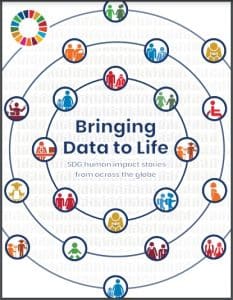
https://unstats.un.org/sdgs/report/2022/flipping-book
https://unstats.un.org/sdgs/report/2022/SDG2022_Flipbook_final.pdf
Bringing Data to Life is an electronic flipping book that collects and showcases the faces and stories behind the data found in global figures on the Sustainable Development Goals (SDGs). It captures real-life stories from across the globe of people who are struggling to get out of poverty, battling the effects of climate change in their daily lives, and dealing with the impacts of COVID-19, among other challenges. The flipping book is organized by Goal, but each story touches upon multiple aspects of the SDG agenda. These stories illustrate how intervention in one or some areas can have positive or negative impacts on other areas across the Goals and how crucial local actions are to achieve the SDGs. The flipping book, for instance, features a story about a self-employed Kithul tree farmer in Sri Lanka, and how the International Labour Organization (ILO), a key United Nations entity in promoting Goal 8 (decent work and economic growth), is working with rural communities to keep Kithul fa mers safe and this important industry alive. The flipping book was developed by the Statistics Division of Department of Economic and Social Affairs (DESA) as a companion product to The SDG Report 2022 with inputs from the United Nations Information Centres and other United Nations agencies and organizations.
The cost of doing too little too late: How cryptocurrencies can undermine domestic resource mobilization in developing countries (UNCTAD Policy Brief No. 102)
https://unctad.org/webflyer/cost-doing-too-little-too-late-how-cryptocurrencies-can-undermine-domestic-resource
Financing for development requires that countries simultaneously mobilize resources from various sources while tackling financial leakages. This policy brief discusses how cryptocurrencies have become a new channel undermining domestic resource mobilization in developing countries. While cryptocurrencies can facilitate remittances, these same digital technologies may also enable tax evasion or avoidance through offshore flows whose ownership is not easily identifiable. In this way, they may curb the effectiveness of capital controls, a key instrument for developing countries to preserve their policy and fiscal space and macroeconomic stability. This policy brief recommends policies to reduce the financial leakages from cryptocurrencies. Given the global nature of cryptocurrencies, it highlights the importance and urgency of international cooperation regarding cryptocurrency tax treatments, regulation and information sharing as well as of redesigning capital controls to take account of the decentralized, borderless and pseudonymous features of cryptocurrencies.
Global Employment Trends for Youth 2022: Investing in transforming futures for young people (ILO)
https://www.ilo.org/global/publications/books/WCMS_853321/lang–en/index.htm
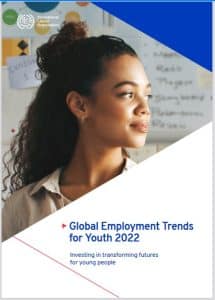
Human Development Report 2021-22: Uncertain Times, Unsettled Lives: Shaping our Future in a Transforming World (UNDP)
Report in English, Overview in English, French, Spanish & Portuguese: https://hdr.undp.org/content/human-development-report-2021-22
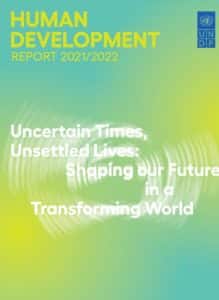
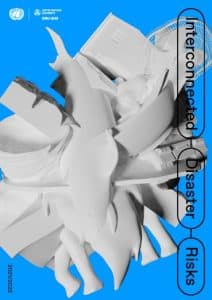
https://interconnectedrisks.org/
Hazards such as earthquakes, floods, heatwaves, and wildfires, can be prevented from becoming life-threatening disasters, according to the authors of a UN report launched on 31 August 2022. From record-breaking heatwaves in British Columbia, to wildfires in the Mediterranean, floods in Nigeria, and droughts in Taiwan; the period between 2021 and 2022 saw record-breaking catastrophic disasters in all corners of the world. Some 10,000 people lost their lives, and an estimated $280 million was incurred in damages worldwide. The latest Interconnected Disaster Risks report, from the UN University Institute for Environment and Human Security (UNU-EHS), finds that many of these disasters shared root causes. At the same time, the study’s authors found that the solutions to preventing or managing them are also closely linked.
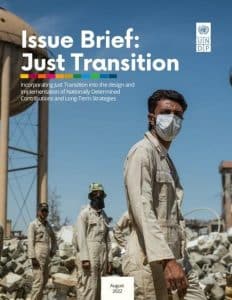
https://www.undp.org/publications/issue-brief-just-transition
A green transition is at the heart of meeting the Paris Agreement goals. Nonetheless, if not managed well, it also runs the risk of increasing social inequality, civil unrest, and less competitive businesses, sectors and markets. Transition pathways have distributional consequences – job losses are likely to occur in certain sectors, regions, and/or communities, particularly where dependence on fossil fuels or carbon-intensive practices are high and where opportunities for economic diversification are limited. As countries are continuing to update and implement their shorter- and longer-term national climate pledges, there is a unique opportunity to embed the principles, processes, and practices of just transition within them. The experience of Climate Promise has demonstrated that Nationally Determined Contributions (NDCs) can be a powerful tool to define climate action through inclusive and whole-of-society owned processes. This report sums up the five key areas in which scaled up support will be provided to promote a just transition towards a climate-resilient and low carbon economy, building on the support under the Climate Promise.
Managing Risk for Safe, Efficient Trade: Guide for border regulators (UNECE / ITC)
https://intracen.org/resources/publications/Managing-Risk
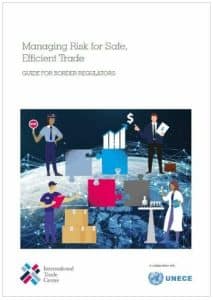
Progress on the Sustainable Development Goals : The Gender Snapshot 2022 (UN Women / DESA)
English: https://unstats.un.org/sdgs/gender-snapshot/2022/
additional languages forthcoming
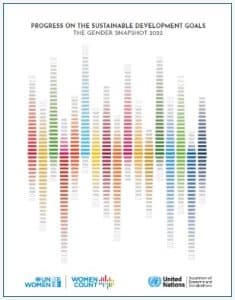
see also: It will take 22 years to close SDG gender data gaps (6 September 2022): https://www.unwomen.org/en/news-stories/feature-story/2022/09/it-will-take-22-years-to-close-sdg-gender-data-gaps
Protect, Prepare, Prioritize: A call to action on climate and children (UNICEF)
https://www.unicef.org/reports/protect-prepare-prioritize
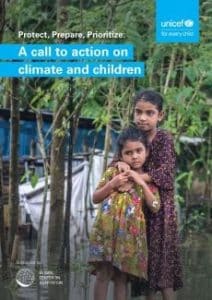
SDGs Learning, Training and Practice: 2022 Edition Report
https://bit.ly/SDGsLearningReport
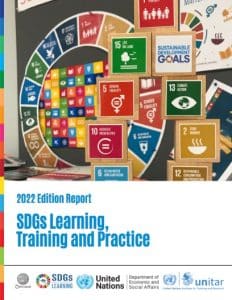
UN DESA Policy Brief No. 138: Improving the criteria to access aid for countries that need it the most
https://www.un.org/development/desa/dpad/publication/un-desa-policy-brief-no-138-improving-the-criteria-to-access-aid-for-countries-that-need-it-the-most/
The COVID-19 crisis has brought to the fore the need to better account for the multidimensional vulnerabilities of countries in the allocation of aid.
UN DESA Policy Brief No. 137: Ensuring SDG progress amid recurrent crises
https://www.un.org/development/desa/dpad/publication/un-desa-policy-brief-no-137-ensuring-sdg-progress-amid-recurrent-crises/
SDG progress has been set back, and the outlook faces uncertainty given the cumulative and amplified impacts of the COVID-19 pandemic, the war in Ukraine and climate change. The crises impact all countries, albeit unequally.
Urban design for health: inspiration for the use of urban design to promote physical activity and healthy diets in the WHO European Region (WHO/Europe)
https://www.who.int/europe/publications/i/item/WHO-EURO-2022-5961-45726-65769
City design impacts the physical, mental, and social well-being of communities around the world. A new report prepared by WHO/Europe in collaboration with Gehl design agency looks at ways to promote physical activity and healthy diets in urban settings, thereby putting health and well-being at the centre of city planning. Noncommunicable diseases are a major cause of death and disability worldwide. Health research indicates that 23% of global deaths and 26% of deaths among children under five are due to modifiable environmental factors. Heading this list are stroke, ischaemic heart disease, diarrhoea, and cancers. The WHO report proposes that, rather than simply educating people about making better food choices and about the benefits of physical activity, cities can implement strategies to make those the easiest choices.
WHO Repository of Resources for Air Quality Management
https://extranet.who.int/dataformv3/index.php/729945?lang=en
https://www.who.int/news/item/07-09-2022-who-releases-new-repository-of-resources-for-air-quality-management
A record 6,700 cities and communities in 117 countries are now monitoring air quality. However, over 99% of people worldwide are exposed to harmful levels of fine particulate matter. The World Health Organization (WHO) estimated that in 2019 about 7 million premature deaths were attributed annually to the effects of ambient and household air pollution. WHO is custodial agency for three air pollution-related Sustainable Development Goals, among them SDG 11.6.2, ‘Air quality in urban areas.’ The Organization aims to leverage the health argument for actions on air pollution within the context of cities and human settlements. An integral part of SDG 11.6.2 reporting at the national level is the public availability of ground level air pollution data. As the collection and auditing of this data is an inherent part of a country’s Air Quality Management System (AQMS), in developing and implementing an AQMS, countries are also enhancing their ability to meet the SDG 11.6.2 reporting criteria. Released on International Day of Clean Air for blue skies, the WHO online repository contains over 100 UN tools and guidance documents which can be used to develop and implement air quality management strategies. A complementary report, Air Quality in Cities. SDG 11.6.2 Working Group Report, which will be released in the coming weeks will illustrate the connection between air quality management and specific areas such as policy-making, health impact assessment, valuation of health cost and training programs, among others.
WHO/Europe Policy Briefs on Monkeypox
WHO/Europe has launched a series of new policy briefs on monkeypox for the WHO European Region, which covers 53 countries across Europe and central Asia. The briefs will support Member States that are already responding directly to the outbreak, and help to prepare those that have not yet reported cases.
The first brief in the series, entitled “Considerations for the control and elimination of monkeypox in the WHO European Region”, was developed in collaboration with the European Centre for Disease Prevention and Control (ECDC). It provides an overarching set of recommendations on how to control the outbreak and, ultimately, achieve and sustain elimination of monkeypox in the Region. No single intervention will achieve this goal – success will depend on the application of multiple interventions in combination.
The second document in the series, entitled “Policy brief on vaccination against monkeypox in the WHO European Region”, will be of particular interest to national immunization programme managers. It provides a useful reference for planning monkeypox vaccination programmes, especially in the context of limited supplies of vaccines and the need to generate evidence on their use.
International Peace and Security
Concept note for the Security Council briefing on “Maintenance of international peace and security: promote common security through dialogue and cooperation”
English, French & Spanish: https://undocs.org/S/2022/617
In its capacity as President of the Security Council for the month of August 2022, China convened a Security Council briefing on the theme “Maintenance of international peace and security: promote common security through dialogue and cooperation” on 22 August 2022. In order to guide the discussions on the topic, China has prepared this
concept note.
Fifteenth report of the Secretary-General on the threat posed by ISIL (Da’esh) to international peace and security and the range of United Nations efforts in support of Member States in countering the threat (S/2022/576, 26 July 2022)
English, French & Spanish: https://undocs.org/S/2022/576
“Introduction: 1. In adopting its resolution 2253 (2015), the Security Council expressed its determination to address the threat posed to international peace and security by Islamic State in Iraq and the Levant (ISIL, hereinafter referred to as “Da’esh”) and associated individuals and groups and requested that the Secretary-General provide an initial strategic-level report on the threat, followed by updates every four months. In its resolution 2610 (2021), the Council requested that the Secretary-General continue to provide, every six months, strategic-level reports that reflect the gravity of the threat posed by Da’esh to international peace and security and the range of United Nations efforts in support of Member States in countering the threat.
2. The present report is the fifteenth such report. … 3. During the first half of 2022, the threat posed by Da’esh and its affiliates to international peace and security continued to rise, with no deviation from the trend observed in the past two years. The threat remains particularly high in conflict-affected settings, from where it may potentially spill over to non-conflict areas. Despite significant leadership losses, Da’esh and its affiliates continue to exploit security gaps and conditions conducive to the spread of terrorism to recruit and to organize and execute complex attacks. The global economy slowdown and growing inflation, as well as the fiscal and monetary measures implemented by Governments in response to them, may render such conditions even more conducive to the spread of terrorism, potentially increasing the threat further.”
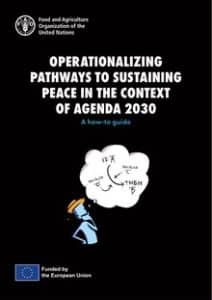
https://www.fao.org/documents/card/en/c/cc1021en
Violent conflict has increased in recent decades. The number of people worldwide who live in settings where conflict and violence are a daily occurrence is increasing. By 2030, it is estimated that more than half of all people living in poverty will be found in countries affected by high levels of violence. These conflict dynamics have a negative impact on households’ food security. Agriculture, natural resources, food security and nutrition can be sources of peace or conflict, crisis or recovery, tragedy or healing. Underpinning this is ensuring that the Organization’s projects and interventions are conflict-sensitive so that all stakeholders understand the dynamics of the diverse contexts in which FAO works. Especially in fragile and conflict-affected contexts, we need to make sure that our work avoids contributing to divisions, disputes and violent conflict, and does no harm. All that we do – both by ourselves and through partnerships – should follow this approach. We can also identify where FAO can positively contribute to social cohesion and peace – and these efforts must be rooted in robust theories of change. FAO is placing increasing emphasis on ensuring that our interventions make a positive contribution to peace – an objective shared across the United Nations system, and increasingly a requirement of our partners and donors. The focus of this how-to guide is to elaborate the pathways through which the Organization can optimize deliberate contributions to peace, and inform the design, adaptation and impact measurement of its interventions. In recent years, FAO has developed corporate tools, guidance and training on conflict sensitivity and context analysis. Operationalizing pathways to sustaining peace in the context of Agenda 2030 – A how-to guide is another crucial document in that series, developed through collaboration between the FAO Conflict and Peace Unit and Interpeace in the context of a wider partnership between the two Organizations. Following broad consultation across the Organization, this document provides operational guidance and inspiration to FAO project and technical staff on how our work can enhance FAO’s contributions to peace – and how to measure those contributions. It is part of an ongoing process, which complements FAO’s efforts through its Strategic Framework to support the transformation to more efficient, inclusive, resilient and sustainable agrifood systems, for better production, better nutrition, better environment and better life, leaving no one behind.
Human Rights
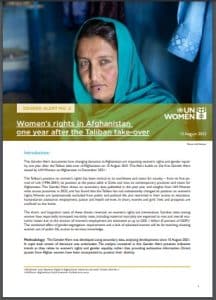
https://www.unwomen.org/en/digital-library/publications/2022/08/gender-alert-no-2-womens-rights-in-afghanistan-one-year-after-the-taliban-take-over
The Taliban’s position on women’s rights has been central to its worldview and vision for society—from its first period of rule (1996–2001), its position at the peace table in Doha, and now, its contemporary practices and vision for Afghanistan. This gender alert draws on secondary data published in the past year and insights from UN Women visits across provinces in 2022; the analysis has found that the Taliban has not substantively changed its position on women’s rights. Women are systematically excluded from public and political life and restricted in their access to education, humanitarian assistance, employment, justice, and health services. In short, women’s and girls’ lives and prospects are confined to the home.
Mapping the nexus between media reporting of violence against girls (UNICEF/UN Women)
https://www.unwomen.org/en/digital-library/publications/2022/08/mapping-the-nexus-between-media-reporting-of-violence-against-girls
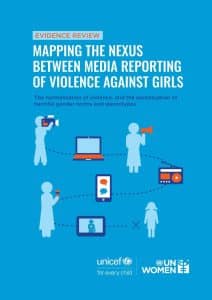
OHCHR Assessment of human rights concerns in the Xinjiang Uyghur Autonomous Region, People’s Republic of China (31 August 2022)
https://www.ohchr.org/sites/default/files/documents/countries/2022-08-31/22-08-31-final-assesment.pdf
A long-awaited report by the Office of the UN High Commissioner for Human Rights (OHCHR) into what China refers to as the Xinjiang Uyghur Autonomous Region (XUAR) has concluded that “serious human rights violations” against the Uyghur and “other predominantly Muslim communities” have been committed. The report published on 1 September 2022 in the wake of the visit by UN High Commissioner of Human Rights, Michelle Bachelet in May, said that “allegations of patterns of torture, or ill-treatment, including forced medical treatment and adverse conditions of detention, are credible, as are allegations of individual incidents of sexual and gender-based violence.” In a strongly-worded assessment at the end of the report, OHCHR said that the extent of arbitrary detentions against Uyghur and others, in context of “restrictions and deprivation more generally of fundamental rights, enjoyed individually and collectively, may constitute international crimes, in particular crimes against humanity.”
Humanitarian Affairs
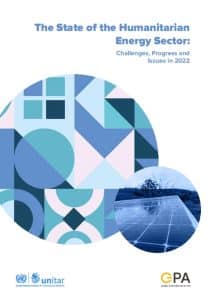
https://data.unhcr.org/en/documents/details/95220
The State of the Humanitarian Energy Sector (SOHES) report explores the major challenges, progress and issues associated with humanitarian energy. This seminal report was led by the Global Platform for Action on Sustainable Energy in Displacement Settings (GPA) and co-authored by leading humanitarian energy institutions: UNITAR, Chatham House, IOM, SEforALL, GIZ, Practical Action, NORCAP, Mercy Corps, University of Oxford, MECS, UNDP, Imperial College London, Selco Foundation, International Lifeline Fund, and UNHCR. The SOHES report aims to inspire and encourage humanitarian energy sector partners, the private sector, and donors to progress towards better funding, inclusive policy-making, enhanced data collection, and inclusive innovative delivery towards achieving SDG7 targets.
Newsletter Archive: https://unric.org/en/unric-info-point-library-newsletter-archive
